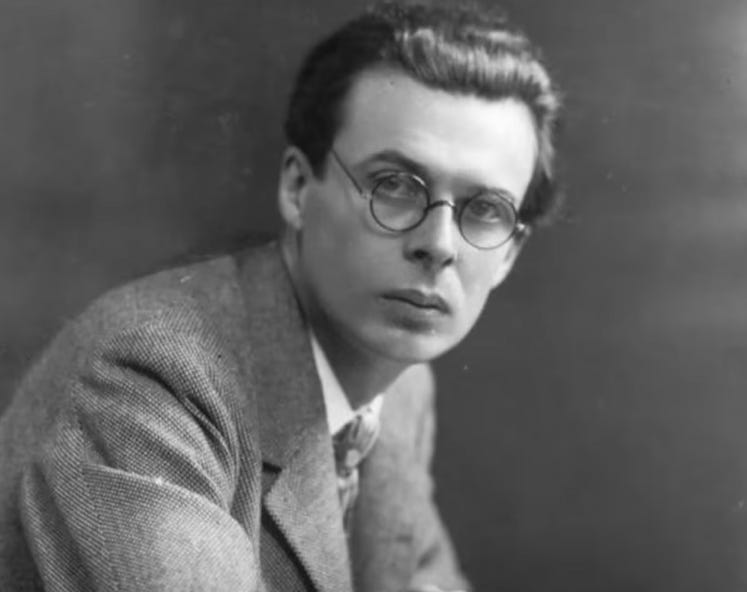Has Huxley's 'Brave New World' Already Arrived?
The Progressives of yesterday were wrong about just about everything. But at least they sought to improve the individual.
The Progressive Era (1896–1917) was one of the most pivotal chapters in American history. The period is defined primarily not by its emphasis on progress (who doesn’t want that?) but its willingness to use the state’s monopoly on force to achieve it.
(I never found it coincidental this period ended amid the most bloody, senseless war humanity had ever fought: World War I. But I digress.)
The Progressive Era ended in 1917, but progressivism, of course, did not. The era’s conclusion merely marked the beginning of the long, slow death of a quintessentially American idea: the notion that government was supposed to be limited.
Despite the horrors that resulted from super-charging nation-states, Americans fell for the belief that the state was not a necessary evil but a force for good that could improve society and crush vice. Everything from beer and joints, comic books and nudie magazines were targeted by federal lawmakers in the decades that followed.
These initiatives all proved either disastrous or quixotic, and all could have been avoided if lawmakers had simply read Lysander Spooner’s classic work Vices Are Not Crimes.
But there’s a notable difference with the progressives of yesterday and today’s champions of statism, and Jeffrey Tucker articulated it well in a recent tweet.
“I think often of Prohibition and the old war on drugs, and it prompts a realization. The earnest state of the past wanted what was best for people and chose the wrong means to deliver that.
Today's dystopian corrupt state wants what is worst for people – recall that liquor stores and weed shops stayed open while health-food groceries and gyms were closed – so that they will be more compliant, doped up, and dependent.”
It’s a profound insight, one Aldous Huxley would surely have understood.
Huxley, the author of the masterpiece Brave New World, understood that the goals of rulers were not the same as those of the individual. It was not in the interest of the World State to have independent, moral, free-thinking citizens. It preferred citizens who were dependent, controlled, docile, and obedient.
Give them plenty of sex, soma (a drug), and conditioning and you had the makings of a perfectly controlled society—and an utterly dystopian one.
Indeed, despite its affluence, the society in Brave New World is in some ways more terrifying than George Orwell’s Oceania. Instead of subjugating citizens with raw force and terror like Big Brother, Huxley’s dystopia subjugates them with pleasure.
This, Huxley believed, was the totalitarianism of the future.
“A really efficient totalitarian state would be one in which the all-powerful executive of political bosses and their army of managers control a population of slaves who do not have to be coerced, because they love their servitude,” he wrote.
He later added:
“There will be in the next generation or so a pharmacological method of making people love their servitude and producing dictatorship without tears, so to speak, producing a kind of painless concentration camp for entire societies so that people will in fact have their liberties taken away from them but will rather enjoy it.”
This brings me back to the difference between today’s progressives and yesterday’s.
The Progressives of yesterday were wrong to use the power of the state to achieve their desired ends—the only moral purpose of the law is the protection of life, liberty, and property—but at least they sought to improve the individual.
They banned filthy books or images that might corrupt him. They targeted spirits that made him drunk and abusive. They banned drugs and ran multi-million dollar media campaigns discouraging children from using them.
Today’s progressives (whom I will broadly define as neo-Marxists and social justice fundamentalists) are a very different story.
They are more interested in giving needles to users than banning drugs. They’ll shut down your church and close your gym to keep you safe, but leave the liquors stores open and let you buy lotto tickets. They see waking up early as toxic and are hostile to self-improvement. (And don’t even get me started on what they’re doing to children through mass “education.”)
To be fair, today’s progressives aren’t yet pushing eugenics and forced sterilizations to usher in their utopia as their intellectual ancestors did.
Nevertheless, I fear this new version of progressivism will turn out to be even more toxic than the last.
Worse, I believe we’re heading down the very road Huxley feared.






Jon enjoyed it as usual. I’m a Huxley acolyte from way back . I wrote a paper on him when I was in high school and have read most of his novels and a lot of his essays. On Brave New World - we may be closer to that than 1984 but BNW is premised on control through pleasure. The society we’re actually getting seems ahnedonic and unhappy . That’s actually not BNW.
Tucker Carlson was always complaining about liquor stores being open during COVID. But I remember thinking, would it make you happy if they too were closed?
The contemporary wokeists do think they are making us better people . They have more in common with old progressives than you realize.Both historic groups are largely humorless people given to coercion and endless moral hectoring.You can see a pretty clear line from Margaret Sanger to today.As for eugenics- hmm - think of abortion and Down’s syndrome.
As for progress, if you mean we
all support change for the better, that’s largely true.
If you have the time listen to Tyler Cowens podcast with John Gray. I think Gray gets the better of him.
💯 Thank you! I think about this often!